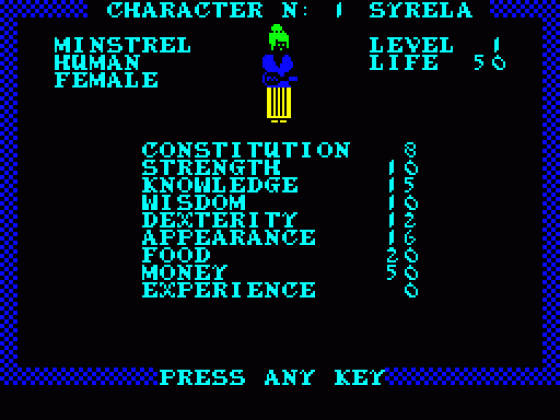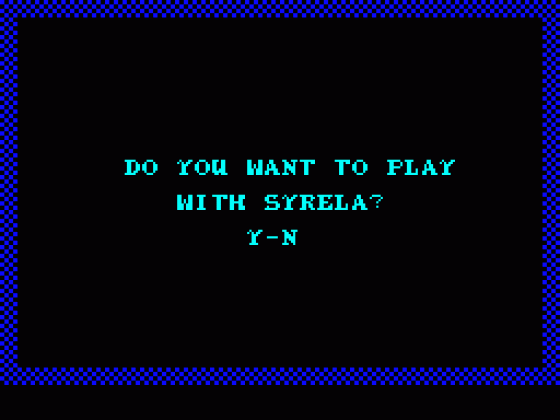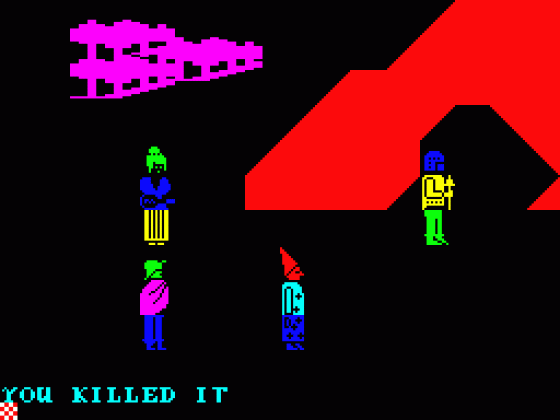
Crash
 1st September 1986
1st September 1986
Categories: Review: Software
Author: Derek Brewster
Publisher: Infogrames
Machine: Spectrum 48K
Published in Crash #32
Mandragore
You know, when you've spent some time in the reviewing business you begin to sense good or bad things about a game the moment you load up, or in some cases, even earlier as you start to plough your way through the instructions. As a rule, if the instructions are overly complex or garbled then the game will turn out to be difficult to play and, more annoyingly, not worth playing in any case.
Mandragore is one of those games where the overly involved instructions are a sign of confusion over where the game begins and where it is going, if anywhere. Perhaps some of the fault lies in the translation as INFOGRAMES are a French outfit (hence the ' chateaux' in the instructions) but this can only be part of the excuse as the instructions are readable. It's just that they are constructed in a way as to make reading them at least three times a must before any proper attempt can be made at the game.
The player's attempts to come to terms with the game's complexities are further frustrated by the mixing of Commodore, Amstrad, Apple and MSX instructions (including disc information) with those for the little old Spectrum. Throw in one or two other major irritations like characters that disappear on screen because they have parts that are the same colour as the background (surely unforgivable) and an ending to the game which is so messy that the first indication is that on checking your characters they would all appear to have expired, and you have a game that goes out of its way to annoy and perplex rather than engage and entertain.

That said, I somehow mustered the patience to get somewhere with this one and discovered an adventure heavily based upon Dungeons and Dragons. The structure of the game is novel, what with its main game code on one cassette and data relating to each one of ten chateaux on another. When the data pertaining to a chateaux is needed, signalled by a prompt on the screen, this data is then loaded from its position on the other cassette. Syrela's Adventure is the first of three options offered at the start, the other two being Your Adventure, where you form your own team via a questionnaire which appears on screen, and Old Adventure which is the option to allow a saved game to be resumed (restarting a game left off in a chateaux involves reloading the castle you were in at the end of the previous game). Syrela's Adventure is recommended for the novice, as here a previously selected team of four characters is offered already ascribed names, races, occupations, gender and characteristics. These last are the familiar D&D labels or pseudonyms Constitution, Strength, Intelligence, Wisdom, Dexterity and Appearance. D&D aficionados will quickly equate this game's Knowledge with DSO's Intelligence, and similarly, Appearance with Charisma. These are given values between 5 and 20 and never exceed 80 in total. In addition, each team member begins with 50 life points, 20 food points, 50 money points and no experience. The Level, which starts at one, is an indication of the maturity where a higher level signifies a more invincible character who is better able to undertake hazardous and difficult deeds.
The choice of race shows the greatest deviation from D&D with the non-standard Mi-Orc and Obbit along with the more familiar Dwarf, Elf and Human. Occupations are more in line with D&D terminology with Warrior, Ranger (Strength must be above 15). Wizard (Intelligence above 15), Cleric (high Wisdom), and Thief (high Dexterity needed). Minstrel is thrown in for good measure and this occupation involves an Appearance above that magic figure of fifteen. The Strength of a Ranger, the Dexterity of a Thief, and the Intelligence of a Wizard can have a great bearing on a game we are told, but I defy anyone to keep awake long enough to find out if this is true.
Games play centres around the screen map which is the localised version of a full map in the middle of the instruction booklet. Crude character block scrolling is the order of the day and the graphics depicting the monotonous stretches of plains, forests, hills, swamps and mountains are uninspiring to say the least. Your team is represented by a solitary figure who resolutely stays in the centre of the map as all scrolls about him. This Map Mode, as the instructions call it. is used primarily to move from one chateaux or village to the other.
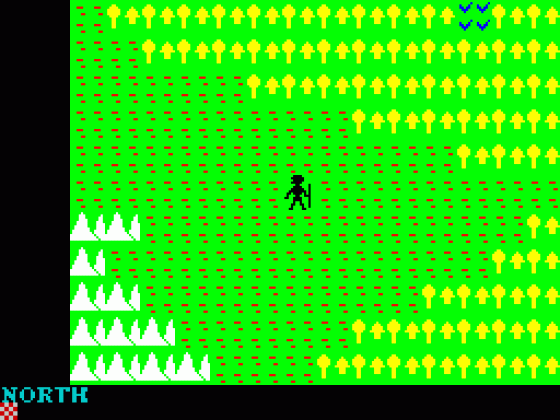
Before long the next mode, Wandering Monsters, is called upon as you bump into your assailants while innocently hiking around the map. The trouble with this mode are the pictures of the monsters which are teletext resolution and often so poor it's impossible to say what exactly is attacking you (is it a bird? is It a fish?' kind of thing). Destroying the monster you can return to map mode or you can skip the whole boring thing, return directly to map mode and forfeit 10 life points for each character.
The villages and chateaux form the third major mode with the villages providing an opportunity to buy (or steal) weapons, torches and food or to sell thins found in the course of expeditions inside the chateaux. The ten chateaux contain about 30 rooms and dungeons each concealing a mystery to be solved and monster traps to avoid.
The way in which the game makes use of abbreviations and one touch entry is clever but marred by the fact that the instructions do not distinguish between CAPS SHIFT and SYMBOL SHIFT. Where the instructions say that SHIFT 0 brings up the name, experience points and life points tally of each character onto the right flank of the screen it is here referring to SYMBOL SHIFT. Where they refer to SHIFT and cursor arrows they mean the CAPS SHIFT. To be honest, if you were to struggle through the instructions to this stage as I did, this state of affairs would not surprise you as most of the early part of getting to know this game consists of pressing keys at random, so confusing are the instructions! But to give credit where credit is due the input system, once mastered, is quite fun.
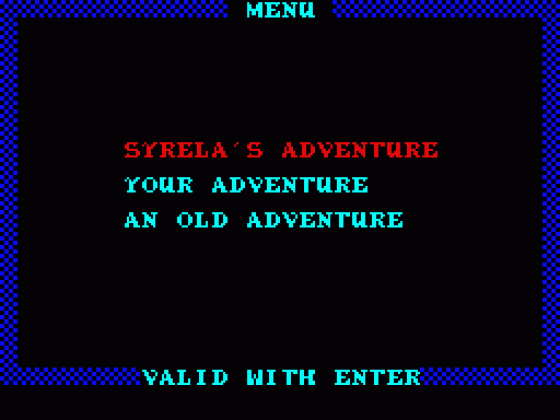
Pressing 1 - 4 brings down a character name, pressing the first two letters of a verb (from a kindly supplied list) brings this down next to it while pressing A - D from the status list down the right flank of the screen completes your input. (A - D normally consist of one monster and one or more objects). There is one major proviso in using the verbs from the lists supplied: certain verbs are occupation specific for instance, only a Cleric can CURE and a Wizard TELEPORT while other verbs are location specific so you must be in a village in order to STEAL, BUY or BARTER. For these reasons early inputs seem to more often than not end with the word 'Impossible' as the program's only retort. When the input system is finally sussed things can still be tricky, like when trying to buy equipment in the villages when everything seems priced well above the starting 50 monies of each character.
Mandragore is an adventure which clearly has had a lot of hard work put into its inception. Like any D&D clone it has a depth and complexity way beyond the normal microcomputer game. The garbled and hotch-potch instructions are infuriating the last thing an already complex game needs as an introduction. However, I think that once the player gets over this hurdle the game proves to have a great deal to offer and those interested in role-playing games on the Spectrum should certainly take the time to get to know and enjoy this one.
Comments
Difficulty: poor instructions necessitate a slow start
Graphics: poor
Presentation: average
Input facility: novel and highly effective
Response: fast
Other Reviews Of Mandragore For The Spectrum 48K
Mandragore (Infogrames)
A review by Gary Rook (Sinclair User)
Mandragore (Infogrames)
A review











